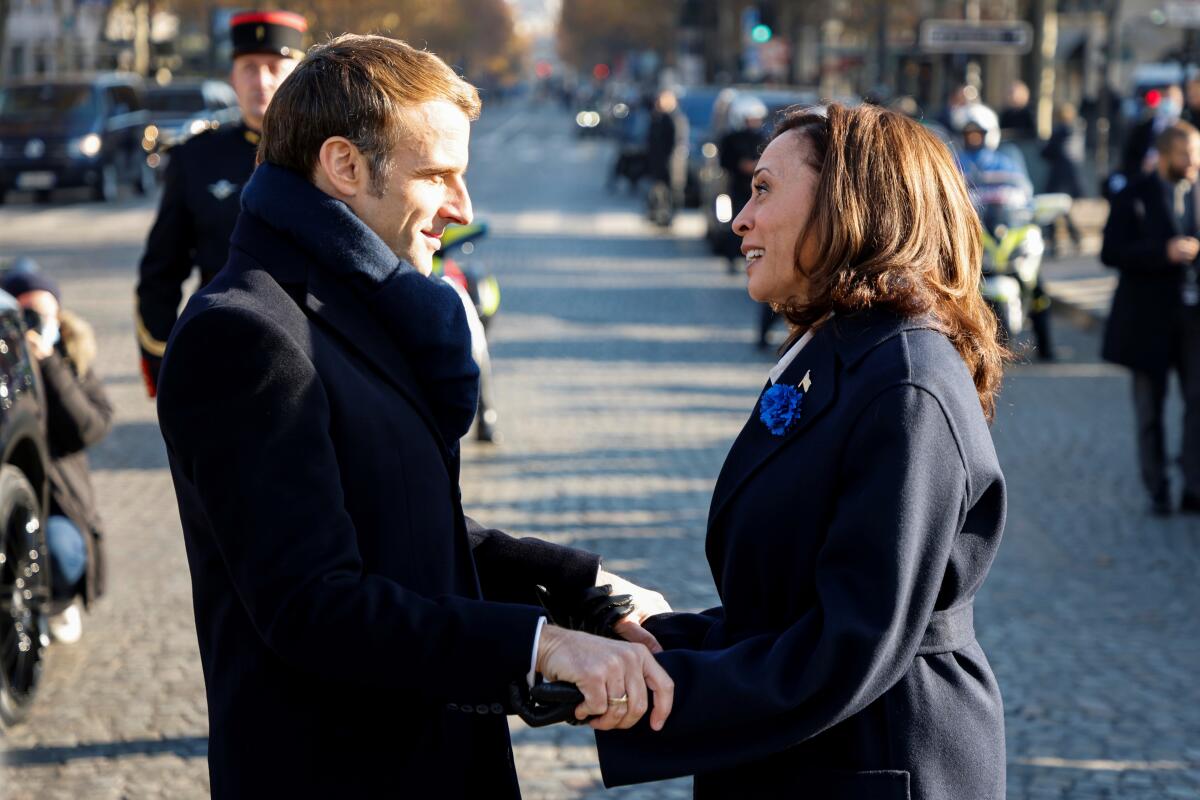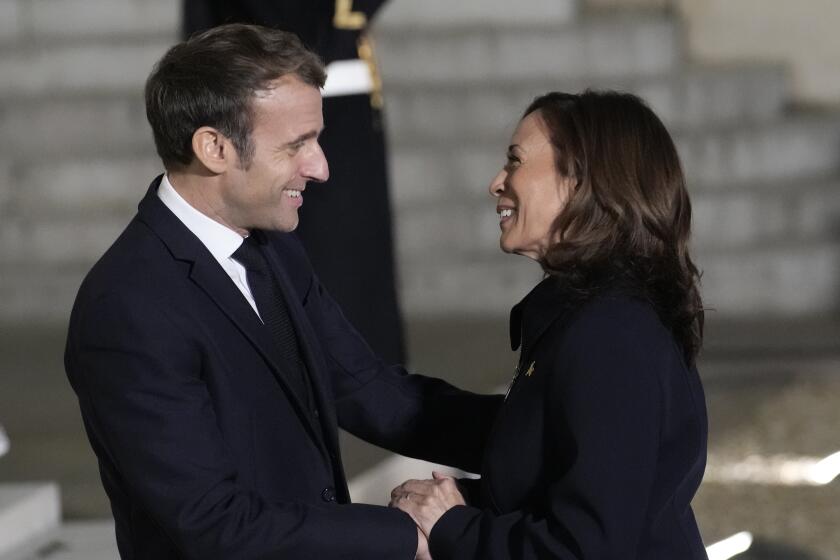On trip to France, Kamala Harris is introducing herself to the world in personal terms

- Share via
PARIS — When Vice President Kamala Harris toured an American military cemetery outside Paris this week, she stopped at the grave of a woman from Oakland who had served as a switchboard operator during World War I.
Harris’ guide said such women, known as “Hello Girls,” were adept at working phone lines. His comment prompted Harris to make a quick point.
“It was one of the few jobs women could have,” said the first female vice president in U.S. history. “Because they could have also been surgeons.”
Harris’ trip to France has afforded her an opportunity to reveal herself on the world stage — highlighting her status as the first woman, and the first woman of color, to serve in such a high office in the U.S. — after she spent 10 months focusing on the COVID-19 pandemic and other crises that have battered her reputation at home.
Kamala Harris’s trip to France is one of the Biden administration’s rebukes of Trump’s ‘America First,’ but Europeans wonder if the U.S. wants to lead.
As she introduces herself to America’s oldest ally, the vice president is doing so in personal terms.
She visited a Parisian laboratory where her mother, an Indian-born scientist, conducted medical research, and as part of her Veterans Day remembrance went to the gravesite of the fellow barrier-breaker from Oakland, Harris’ hometown. Her keynote speech at the Paris Peace Forum on Thursday included references to her mother along with larger themes around growing inequality in the world.
“My mother and her work taught me the power of the short and very important question,” Harris said in her 13-minute speech. “That question being why history is full of leaders — leaders in science and politics and business and the arts and education — leaders who refuse to accept the status quo, who asked why, who took action.”
Harris said problems such as viruses, economic inequality, cyberattacks and climate change do not respect borders and can only be fixed with cooperation among countries.
Harris’ two prior foreign trips as vice president — to Latin America and Asia — were limited by COVID-19 restrictions and overshadowed by controversies involving her remarks about the U.S.-Mexico border and the administration’s chaotic pullout from Afghanistan. Harris’ advisors hope the five-day trip to France will give her foreign affairs reputation a reset.
While Harris’ visit is not garnering the kind of attention a president would receive, she has drawn some interest among the French, who celebrated Barack Obama even before he became America’s first Black president, when he visited as a senator in 2008.
Harris was featured prominently in news accounts after meeting with French President Emmanuel Macron on Wednesday night, and was shown multiple times on live television Thursday, when she chatted amicably with Macron during the national commemoration of Armistice Day under the Arc de Triomphe.
Alexis Buisson, a French journalist based in New York who is writing a biography of Harris, said that in France, people who follow politics, as well as activists who are pushing for the country to address race more openly, have followed Harris’ career.
“Suddenly, you have this political figure like Kamala Harris who comes out of nowhere for the French.... She’s not an old white man,” Buisson said.
“She represents some kind of new America that, frankly, the French prefer to Trump’s America,” he added.
In addition to Buisson’s biography, there is at least one French documentary on Harris in the works.
The vice president has personal ties to France and the French language. She spent her teenage years in Quebec, Canada, including time at a French-speaking school. Though she speaks some French, she has been sticking to English in her public appearances here.
During her visit Tuesday to the Pasteur Institute, she talked frequently about her mother, a cancer researcher who worked there decades ago. At least one of the researchers Harris met with had looked up her mother’s old papers, and complimented them for their early insights.
“The breakthroughs that [my mother] was responsible for in the ’80s was the basis for a lot of great work,” Harris said.
Part of the interest in Harris also stems from the particular moment in Europe — when liberals are grappling with right-wing populism and reexamining their countries’ relationship with race and racism.
Racist language has “become normal, and people say it out loud,” said Rebecca Amsellem, who runs a feminist media company in Paris, of the change in tone.
When Americans protested the police murder of George Floyd last year, the French followed suit with a mass movement tied to Adama Traoré, a young Black man who died in police custody in a Paris suburb.
France’s population is estimated to be 4% to 5% Black, but the country declines to keep official statistics on race — one of many practices that show the difference in how race is portrayed and constructed here compared with in the U.S. The French tradition, born of the Enlightenment, views the notion of citizenship as excluding other identities.
In another sign of affinity with Black Americans, the French next month will bury Josephine Baker in the Pantheon, an 18th century monument in the center of Paris. Baker, an American-born entertainer who moved to France in the 1930s and died in 1975, was active in the French Resistance during World War II, and later in the U.S. civil rights movement.
One of a group of artists and intellectuals who came to France in the 20th century seeking a haven from racism, Baker will be the first Black woman buried at the Pantheon, an honor given to about 80 people, including only five other women. She is now buried in Monaco.
The event will be a source of pride to many French, though people tend to remain uncomfortable around the topic of race and the country’s own history in the slave trade, said Christiane Taubira, the first Black woman to serve as France’s minister of justice.
“Until they are confronted with the question of the issue of color, they don’t think about it,” she said.
That’s why Taubira views the symbolism of Harris’ visit as significant.
“It’s very important for white people who have some prejudices,” she said. “It’s very important for them to see — to watch such a lady with this high level of responsibility.”
More to Read
Get the L.A. Times Politics newsletter
Deeply reported insights into legislation, politics and policy from Sacramento, Washington and beyond. In your inbox three times per week.
You may occasionally receive promotional content from the Los Angeles Times.












